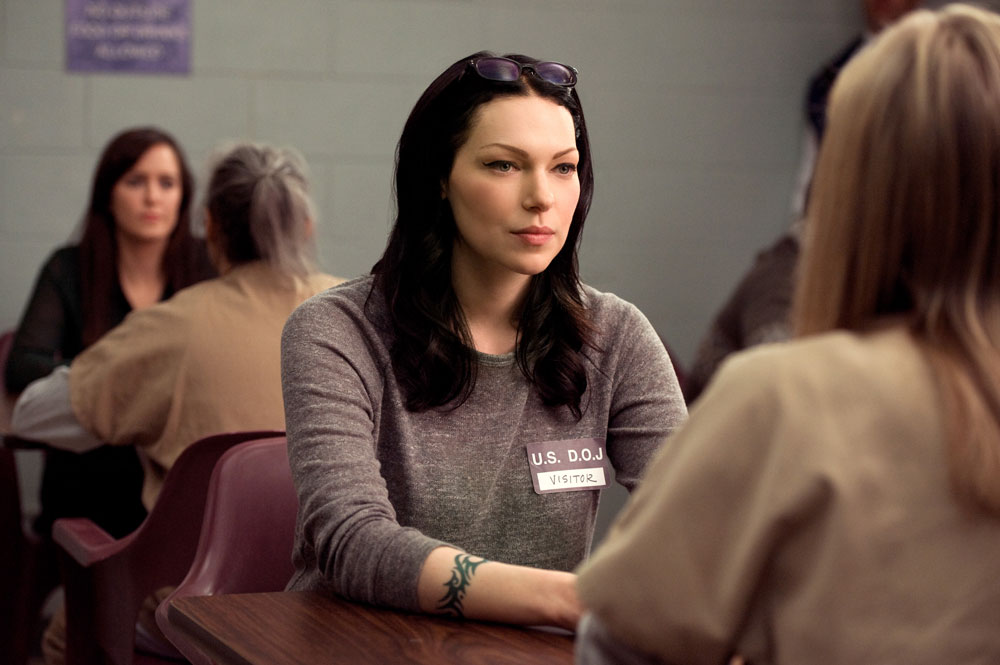 Laura Prepon and Taylor Schilling in Netflix’s “Orange is the New Black”
Laura Prepon and Taylor Schilling in Netflix’s “Orange is the New Black”
Episode 11: “Take a Break from your Values,” Episode 12: “It Was the Change,” Episode 13: “We Have Manners, We’re Polite”
Well, this has been an interesting experiment for us.
Going into this season, we grappled with the question many television reviewers have been dealing with for a few years now: how to review a television show when all the episodes of the season are unleashed on the public at once. We’re not in the monoculture anymore. There are no next-morning watercooler conversations about your favorite TV shows because everyone is watching them at a different time and in a different way. This is new territory and no one really knows what it all means in the long term. That’s exciting. But we’re afraid we’re not keen on the idea of doing episodic reviews of these types of series.
The whole idea of episodic reviewing and recapping came about because shows like LOST and The Wire practically demanded that people get online and talk incessantly about the latest episode until the next one airs. Many reviewing sites have managed to continue that format with shows like House of Cards and Orange is the New Black. We gave it our best shot but in the end, we couldn’t get it done. By about the third week, we could feel that the reader was already moving on to other topics, because they’d finished watching this season weeks before and got their online discussion fix in other places. Even worse, we were finding it difficult to write about episodes weeks after originally watching them. At first we considered the idea that, for next season, we’d watch only one or two episodes a week, but that puts the reviewer in the odd position of knowing less about the season than the vast majority of their audience, who, as we noted, tend to move on from discussion about the show within a month of viewing all the episodes. This is a long way of saying that we probably won’t be doing episodic reviews of this show next season. Then again, aside from Mad Men and Project Runway, we don’t feel the need to do episodic reviews of any other shows anymore. You get locked into this commitment that drastically limits the things you want to talk about. For instance, we’d love to rant about how awful we think The Leftovers is, or how cheesy-but-fun the first episode of The Strain was. Or even how annoyed we were by the otherwise astonishing Snowpiercer for piecing together such facile and paper-thin socio-political metaphors. And then there’s that LOST retrospective we promised you guys like two weeks ago. If this sounds like whining, it’s not meant to. We’re merely musing about the state of things in TV reviewing and where we fit into it as an independently operated blog with a distinct voice. As reviewers, we’d much rather cast our net wide over the landscape than be stuck writing about a small handful of shows week in and week out.
This is not to say that we find Orange is the New Black a difficult show to write about. On the contrary, because Season 2 was so richly detailed, with so many characters getting the spotlight and so many different stories going on, the only problem is knowing when to stop writing about it. You can easily find yourself in the weeds of the story, clapping and cheering, when something tiny and extremely well-executed happens in the margins, such as Ruiz’s boyfriend Yadriel giddily chatting away with their daughter upon the news that Mommy’s not going to be transferred. It was such a small story, happening on the edges of the scenes all season. In fact, we didn’t even realize a story was being told about these two at all until we got to that totally unexpected conclusion, with its totally unexpected result of lumps in our throats and tears in our eyes. There’s so much of that kind of stuff that goes on in Orange is the New Black, from Lorna and Rosa’s slowly growing bond (with its MASSIVE payoff at the end) to Nicky’s already high-strung emotions getting dangerously out of control when heroin is reintroduced to her environment and her prison mommy gets threatened, to Healy and Pennsatucky’s strange little bond that allows them both to find a little comfort with someone else who just doesn’t understand the world. Litchfield prison is a place practically made out of stories, big and small. That’s the entire reason why the show is captivating.
But the major story of the season was the rise and fall of Vee. To be honest, it took us until right around the midpoint of the season to realize that we were looking at something very different from Season 1, which was so Piper-centric. Not only was Piper wholly sidelined from the main storyline, but it was something we’d never have credited the show with trying: the introduction of a major Big Bad; a character who, unlike every single other one, was defiantly not going to be painted in shades of gray. No, Vee was a straight-up villain – and like all good villains, her arrival in the story upended the status quo and redefined relationships left and right. And like all good “defeating the villain” storylines (somewhere else we didn’t expect the show to go this season), there were smoking ruins left in her wake. Taystee and Poussey are healed enough to give us the much-welcome return of “Amanda” and “MacKenzie,” but Suzanne is having a breakdown over the loss of her foster mother and Nicky’s stuck holding a shit-ton of heroin. Looking at it now, we’re struck by just well-crafted this storyline was. Look at how much more we know about Poussey, Taystee, Suzanne and Cindy now. Look at how much Red has learned and changed this season. She’s a character defined by scheming and revenge who chose to put her faith in the system and do “the right thing,” rather than get her family caught up in a war. Look at where Boo is now. Look at how Gloria and Red have come to a begrudging detente due to a common enemy. Vee was absolutely the best part of season 2 and may just be the best thing to ever happen to the show. You couldn’t have asked for a better way to define the characters and then blow up those definitions.
In fact, one of our favorite things about Vee’s downfall is the way in which practically everyone had a hand in her death, even if they didn’t all know they were working together to defeat her. Boo told Nicky where the heroin was so she could steal it. Vee’s former posse kicked her out of the family, thereby stripping her of her power (and paying off the major theme of the season, which was that family=power in prison), Gloria and Norma got Santería on her ass, and Lorna gave Rosa the keys to the van, essentially putting the weapon into her hands. It wasn’t the kind of teamwork that arises out of cooperation and selflessness; quite the opposite, in fact. Plenty of people were acting independently, for totally selfish reasons. But in prison, that’s as good as it gets, in terms of coming together as a community.
There are several points here being made about prison life, not least of which is that you take what you can get, when you can get it. No one really knows or understands how they all came together to defeat this common enemy, but it doesn’t matter. Only the outcome does. Another point being made is how there are consequences in prison, and they can rise up and smack you down at the most inopportune of times. All of Vee’s sins hit her at once, but in the end (literally) it was the sin of rudeness that ultimately did her in. Pride is a huge part of prison life. When you offend someone in this world, they will take retribution, should that opportunity present itself. And finally, as we said, the main theme of the season came down to “Without family, you’re nothing.” Red knew this, which is why she spent the season doing penance and bringing her family back together. In the end, that family helped her defeat her enemy. Sister Ingalls was one powerless ex-nun, undertaking a futile protest, until her sisters showed up, declared that she was still one of the family, and stood in solidarity with her, thereby causing a huge strain on a system already stressed to the breaking point. The entire Daya and Bennett storyline came down to “Are we a family or aren’t we? And if we are, what next?”
Piper’s story, mostly separated from everyone else’s, also had to do with her loss of family and how that’s left her adrift. Her own family has pretty much moved on from dealing with her problems. Larry and Polly have just plain moved on. And Alex betrayed her once again. It hasn’t been the most gripping of stories, watching her go adrift, but she still managed to pull herself together and affect tremendous change by essentially handing Caputo the weapon to take out Figueroa. If Fig’s really gone, we couldn’t be happier. We haven’t been shy about expressing our dislike of this too-broadly-played character and the clumsy attempts to make her seem sympathetic. The gay husband thing is a huge cliche, and her silly “I did my job” speech failed to land, since we know she did no such thing. But maybe that’s the point. Maybe there’s something to be said about the ways in which all these characters are fooling themselves into thinking they’re better people than they are. Look at Caputo, who generally comes across as someone who cares about doing his job well, but then he had to go and do that incredibly shitty thing to Figueroa at the end.The point has been made over and over again, they’re all criminals inside the Litch. It’s to the show’s enormous credit that it can get that point across yet never seem depressing. And except for the obvious villains like Vee, Fig, and Mendez, it gets you to love them anyway. After all, the fist pump moment of the season was watching a bank robber lead the police on a chase and murder a woman for being rude to her – and it was gloriously beautiful. Life-affirming, even. In a weird and probably cynical sort of way.
So, next season? Addictions will be tested. Not only is heroin in the Litch, but so is Alex. Red will eventually find out Piper lied about her family’s restaurant. She’ll also have to deal with the likely closing of her pipeline, since Vee compromised it. Caputo’s never going to be able to keep the lid on Bennett and Daya. We fear we haven’t seen the last of Fig (although we wouldn’t say no to seeing her as an inmate). Suzanne is dangerously unraveled. No one trusts Boo. It’s funny. Writing it all out, it looks like such a mess, but if you’d asked us after the final episode, we’d have said the season ended on an up note. Maybe that’s because it was so finely crafted and we more or less got a definitive ending out of it, which is rare enough in television that it should be treasured. There’s plenty to come for next season, but we ended this one very satisfied, as if we were closing the cover on a book we enjoyed.
[Photo Credit: JoJo Whilden for Netflix]
Diane Kruger Style Double Shot Next Post:
Julie Bowen in Dsquared2 at the “Planes: Fire & Rescue” LA Premiere
Please review our Community Guidelines before posting a comment. Thank you!



